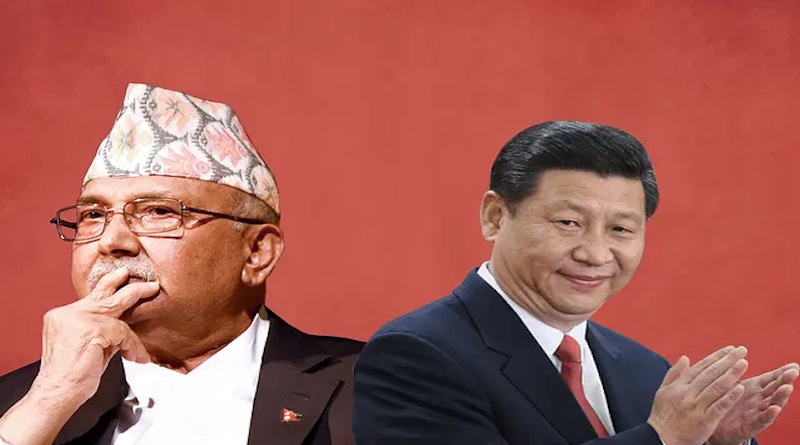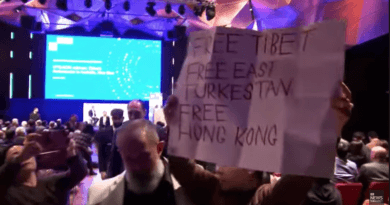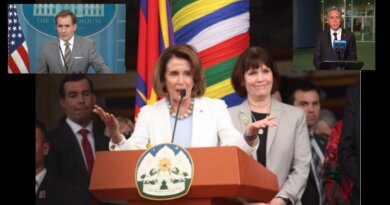Nepal’s Coalition Government Collapses Amid Accusations of Chinese Influence
By Tsering Choephel

DHARAMSALA, 6 March: The ruling coalition government of Nepal, comprising the Communist Party of Nepal (Maoist Centre) and Nepali Congress (NC), collapsed on Monday, with Prachanda of the Maoist Centre joining hands with the Communist Party of Nepal-Unified Marxist Leninist (CPN-UML) to form a new government, signalling influence and victory for Beijing, according to several online reports.
Citing persistent differences between them, particularly over the post of chairman of the Nepalese National Assembly, with each party vying for their own candidate, Prachanda on Monday dissolved his party’s alliance with Sher Bahadur Deuba-led NC party, according to a report published on swarajyamag.com today.
Kathmandu has been marred with uncertainty and an unstable coalition for years, with numerous reports suggesting Beijing’s covert operations to influence and unify Leftist parties in Nepal to sway Kathmandu in Beijing’s favour.
According to the report, NC Vice President Purna Bahadur Khadka, who was the deputy prime minister and the defence minister in the outgoing cabinet, confessed that the cited differences were not serious enough to cause the collapse of their alliance with the Maoist Centre. “In fact, we even offered to withdraw our candidate for the Rastriya Sabha chairman’s post and support the Maoist nominee. We were also willing to offer the finance ministry to the Maoists for the sake of keeping the alliance intact,” he said.
Moreover, the outgoing health minister from the NC party, Mohan Bahadur Basnet, stated that Prachanda had informed Deuba in their last meeting on Sunday (3 March) that he (Dahal) was under pressure to break the alliance with the NC.
“Dahal told our party chair (Deuba) that he was under a lot of pressure to join hands with the UML. He told Deuba that he could no longer resist the pressure,” he said.
For years, Beijing has been making efforts to destabilise the left-right coalition government in Nepal and to persuade Prachanda to join hands with Khadga Prasad Sharma Oli of CPN-UML, who is known for his strong pro-China stance, causing considerable concern to its southern neighbour, India.
Another report from swarajyamag.com on 23 February mentioned numerous Chinese politicians making frequent visits to Nepal to iron out differences between the two largest leftist parties of Nepal, the Maoist Centre, and CPN-UML. In 2023 alone, more than three dozen Chinese delegations visited Kathmandu, and in the first six weeks of this year, five Chinese delegations have reportedly arrived for the mission.
Khadga Prasad Sharma Oli, Chair of CPN-UML, served as Nepal’s prime minister for two terms, from 2015-2016 and 2018-2021. His rule facilitated a favourable environment for China to significantly expand its influence and agenda in the Himalayan nation. Known for his anti-India and anti-US sentiments, Kathmandu’s relations with New Delhi became strained and concerning.
Bimal Shrestha, a professor of political science at Nepal’s premier Tribhuvan University, explained that “China wants UML to agree to Dahal continuing as the PM if he breaks away from his alliance with the NC. And if the NC agrees to snap ties with Dahal, then it wants UML to agree to NC’s terms, which will include making Deuba the PM. Because what matters at the end of the day is putting Oli back in power. Even if Oli is not the PM in a new dispensation, the UML will be part of the ruling alliance, and Oli will wield a lot of influence. That means Beijing will be able to retrieve lost ground in Nepal.”
According to the report, the Chinese Communist Party hopes for a strong united communist party in Nepal, which, in Beijing’s calculation, will become the most powerful political force in the country and a natural ally of China.
As proven in many past events, including the most recent development, many observers cast doubt on how long this new alliance between the two communist parties of Nepal would last, much less without differences and factions.






